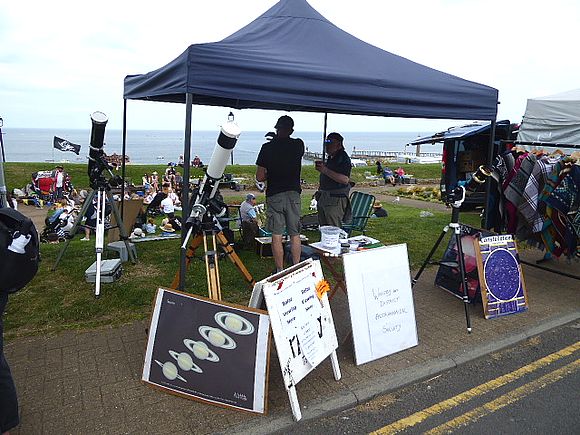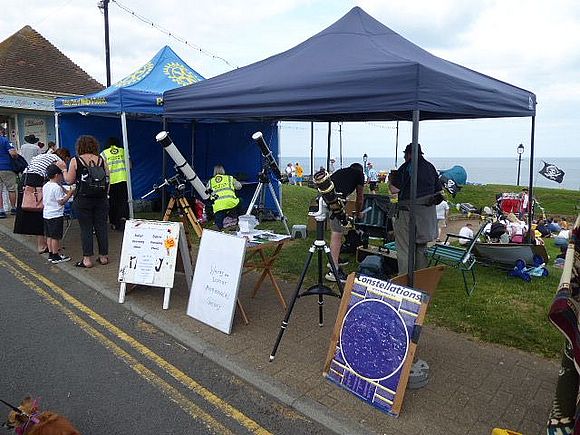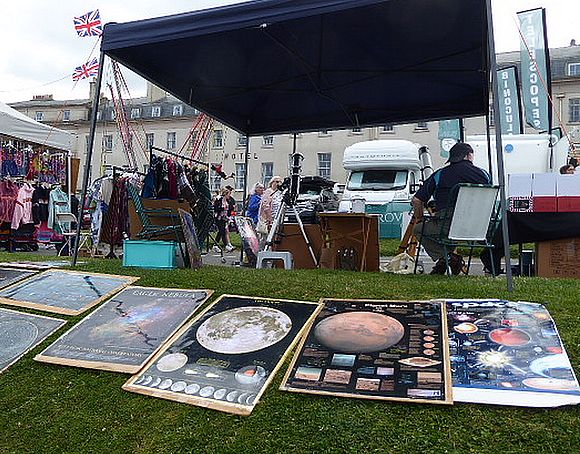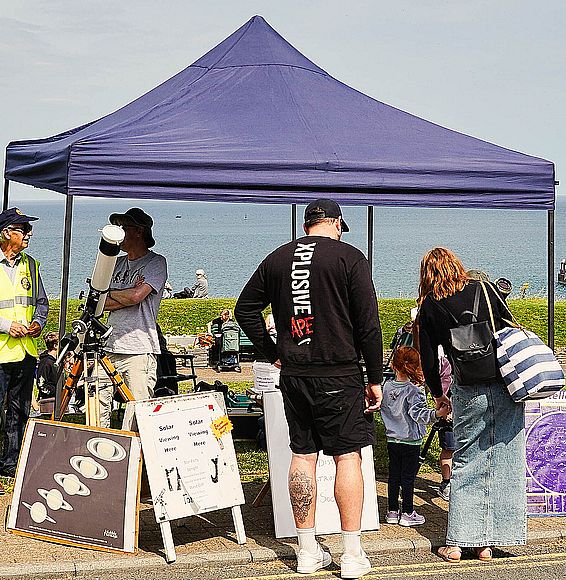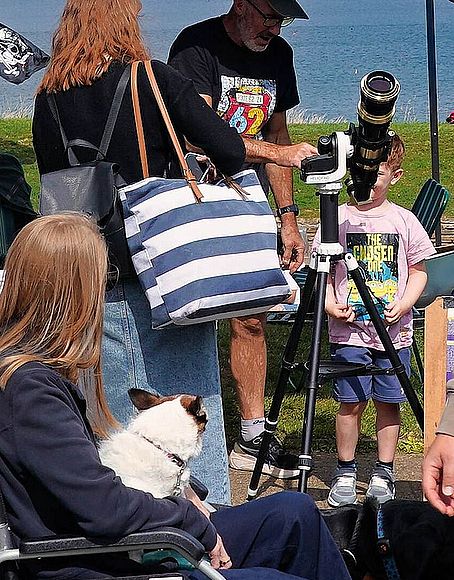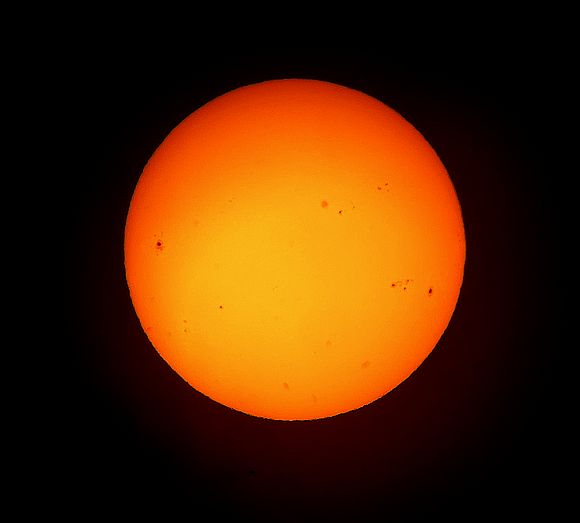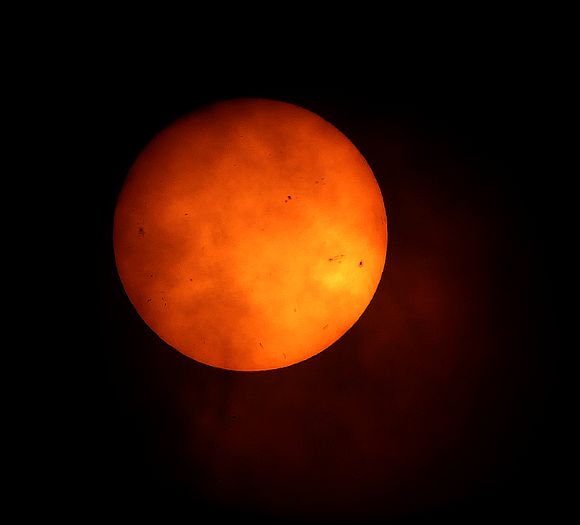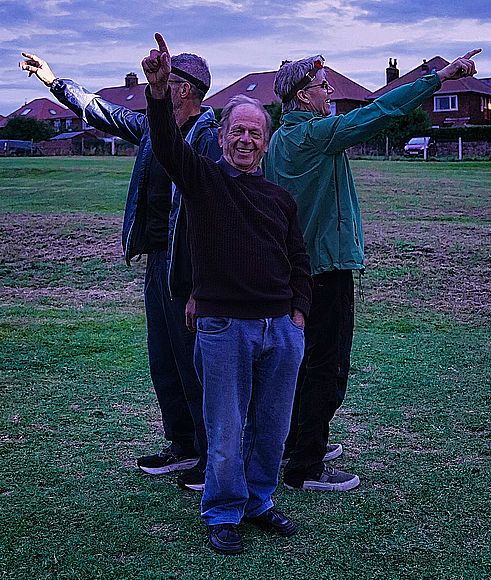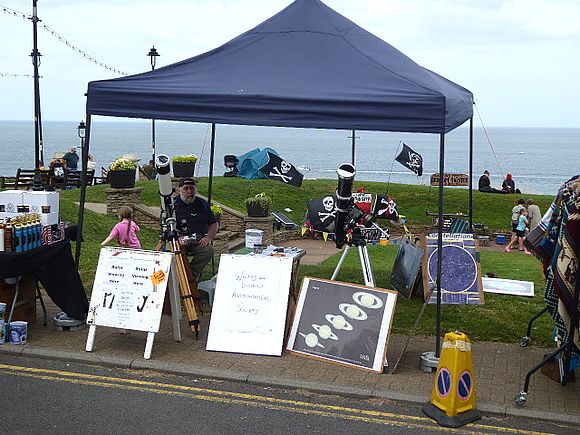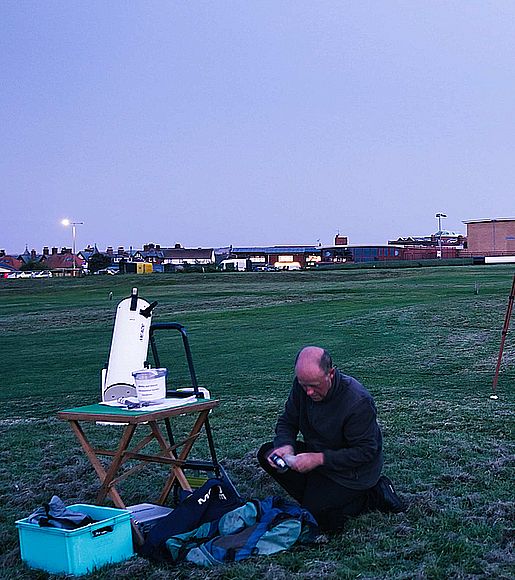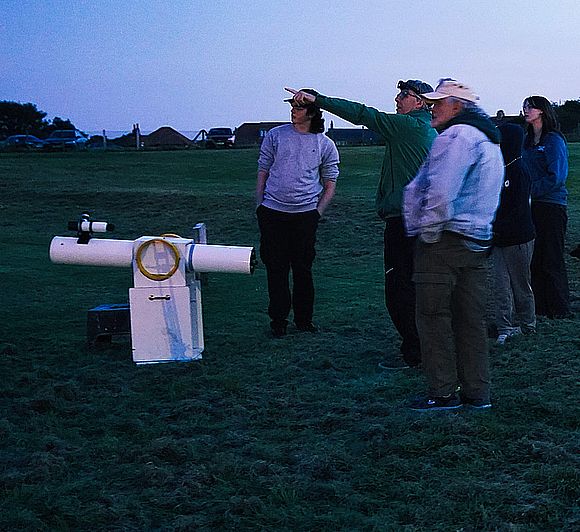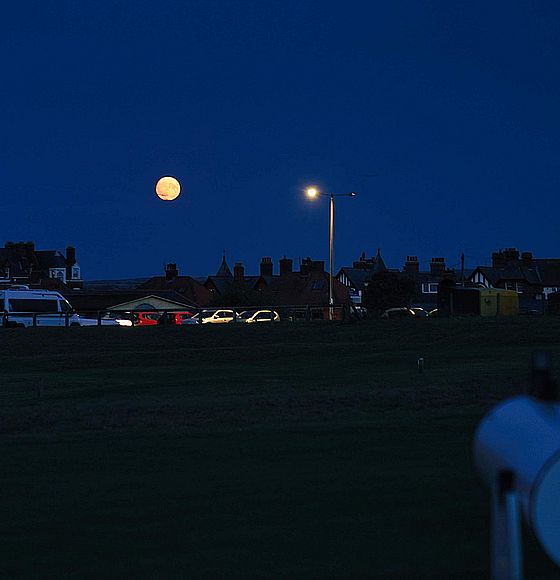There is a relationship between Whitby Regatta weekend and the weather, and it's often not a stable one. Wind and rain one year, heatwave and sea fret another, showers and cloud all too often. No matter what the August dates for Regatta are, mother nature conspires to be as awkward as possible - especially from our viewpoint, an observer’s viewpoint, grappling to make the best (and sometimes sense) of the typically mixed bag of conditions served up. This year however looked set to be different, with forecasters a few days out from Regatta weekend reassuringly narrating a picture of mild, chiefly sunny days with clear skies overnight. A perfect weekend. Things looked uncharacteristically promising!
The 'solar viewing campsite' for the Regatta weekend.
Keith and Richard watch a Cpt Kipper show. Image by Mark D. (Click for full image)
Our 'pitch' on the West Cliff was next to Grovers Optics, but having been up on the Friday evening to say hello to Marcus at the stand, it became apparent there would be little room for all our equipment given the display units arranged in front of the main trailer. Fortunately, a vacant pitch was offered to us just across the drive on the bank of the sunken garden large enough to erect the gazebo.
Saturday morning dawned sunny, and Mark journeyed up to the West Cliff around 11am, to find Keith and Richard already there with Keith's solar scope set up at the Grovers stand. Informing them of the change in plan, we began the process of unloading the car, erecting the gazebo, moving Keith's scope and setting up the two refractors to be used for solar viewing. Within half an hour the task was done, with the car parked up on the grass behind Marcus's vehicle (just a little manoeuvring of an ambulance to achieve this). The Sun was out, sunspots were numerous - what could go wrong? No prizes for guessing, the weather! Going from mild and sunny, to mild and cloudy for the afternoon, and as it turned out - the evening. Just to rub salt into our observing wounds, Sunday was forecast to be a carbon copy with one exception, Sunday evening was more likely to be clear.
Richard showing a 'higher being' sunspots. Solar viewing Saturday afternoon.
Image Keith D (Click for full image)
Back to Saturday afternoon, and it wasn't all doom and gloom - conditions were pleasant, but frustratingly just not good enough for any prolonged solar viewing periods, snatched minutes here and there, remarkably similar to many previous Regatta solar events. The difference being when the Sun did show its face there were some spectacular sunspots to view, and in Keith's H-alpha filtered solar scope an array of solar flares licking from around the sun's limb, quite superb.
A whole host of sunspots. Image by Mark D hand held compact camera at the eyepiece,
glass solar filtered 120mm refractor
(Click for full image)
As the afternoon wore on, interest in the evening star party was heartening, and with the forecast predicting partly clear skies, (BBC gave total clear skies) there was a degree of optimism for the evening event. At the end of the afternoon rather than reload the car with everything only the two refractors were, the gazebo was tethered down and left in situ with the poster boards and placards squirrelled away under the Grover trailer.
Sunspots and cloud - sums up the afternoon nicely!
Image by Mark D hand held compact camera at the eyepiece,
glass solar filtered 120mm refractor
(Click for full image)
Saturday evening was neither clear, nor even partly clear - just mostly cloudy - thin cloud, but thick enough to prevent any observations at all. Brian, Keith, Mark and Richard along with several big beasts - various dobsonians, were left standing looking up at an all too familiar sight, hoping for some breaks or clearances, but no. John L arrived as did a few other optimistic souls, Mark doing his best to point out where stars would be, show them meteorites and talk up Sunday evening. By 10:20pm we called it a night, packing away the equipment eyeing a very washed out, partly obscured Moon trying to show face as we did so. As the hatch closed on the car, Vega mockingly appeared! We headed home.
Sunday, and good news, the gazebo was still in situ, but so too unfortunately was the cloud. Mark and Keith manned the scopes on a frustrating afternoon, glimpses now and then of the Sun, but for no length of time and we kept having to realign the scopes when it did shine. It was late afternoon before clouds finally began to thin and break allowing some fine views of the sunspot groups visible. It did at least look as though the evening would turn clear and so leaving the gazebo up for a second night, the car was carefully extricated from the grass, (aided by Keith) along the pavement and onto the road (don't ask) and Mark departed home to re-fuel, reload and prepare for the evening.
Once again, Mark and Richard joined Brian, Keith and John on the Pitch and Putt area to the rear of the Archery Green, but under predominantly clear skies and little breeze. Setting up the instruments in good time; 2 x 250mm (10") dobsonians, 1 x 180mm (6") dobsonian, 1 x 102mm (4") refractor, a 50mm refractor (Richards) and John L 's Cassegrain, gave chance to take in the cavalcade of fairground pan-technican rides making their way along the West Cliff heading for the pier and harbourside. The almost full, blue, supermoon (not heard that definition of a Blue Moon before) dissected by a thin band of cloud appeared above the SE horizon looking quite spectacular.
People began to arrive, like moths drawn to the light of the Moon, and we were in business! Given the low elevation of the Moon, the seeing was surprisingly good, a stunning sight to the rapidly growing crowd. The brighter stars appeared - the usual suspects, Vega, Arcturus, Altair, Deneb and Capella, allowing alternative observations to the bright yellow-orange Moon. As dusk fell, a few constellations emerged, Mark pointing out the identity of those dimly visible. It became evident that despite being low, moonlight was hampering visibility, affecting sky conditions and rendering fainter stars invisible.
It was hoped to catch Saturn rising, but it had so far eluded detection, so it was with some relief we finally spotted it training most of the scopes towards it. The image was surprisingly steady, and people seemed thrilled to be able to view the rings even if they were rather closed with ring plane crossing just 7 months off.
It was a shame that hunting down any deep sky objects was futile as sky visibility deteriorated, a 'milkiness' masking all but the brighter stars. By 10:30pm the crowd slowly began to thin out, people satisfied with the evening, and gradually telescopes were dismantled leaving just a couple aimed at the Moon and Saturn, the latter increasingly difficult to appreciate.
Finally, the last few observers went their ‘merry way’ as cloud cover began to build in, ending a relatively successful evening. Not perfect, but at least the Moon was stunning, Saturn better than expected, and not a drop of rain fell - for once!
Monday dawned, hazy sun, a strengthening breeze and a dilemma, to view, or not to view. The forecast was not encouraging for the afternoon, with rain on the cards for later. Mark decided conditions were not good enough and roping in his wife went up to the cliff and dismantled the gazebo. Placards and poster boards etc were also loaded back into the car, and our WDAS regatta events were concluded. Later in the afternoon Mark did venture up to see Marcus and Tarn at the Grover Optics stand, chew the cud and make plans for next year, before saying farewell.
And so, our involvement for Regatta 2024 was done, different conditions (no rain for once) and yet so reminiscent of many past Regatta's, successful in parts, (un)predictable and frustrating, but still enjoyable when the Sun and Moon shone, and Saturn made an appearance on Sunday evening.
Special thanks to WDAS members Keith (who assisted throughout), Richard R and Brian A for assistance and transportation, and John L who assisted at the evening events, it was much appreciated.
- Log in to post comments

